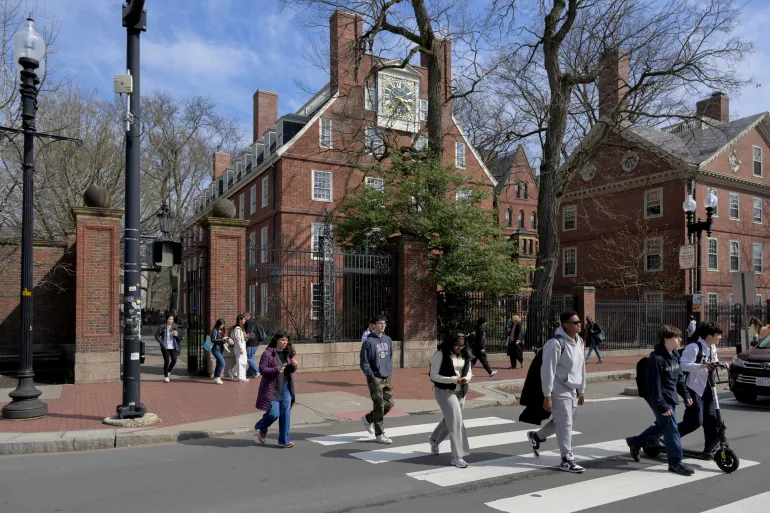1. Judge Halts Trump’s Effort to Block Harvard’s Foreign Student Enrollment
A United States federal judge has issued a temporary injunction against a Trump administration move to prevent Harvard University from enrolling international students. The decision came in response to an emergency petition filed by Harvard on Friday in the U.S. District Court in Boston.
Harvard sought urgent legal relief after the Department of Homeland Security (DHS), under Secretary Kristi Noem, revoked the university’s access to the Student and Exchange Visitor Program (SEVP) a system required for certifying and admitting international students. U.S. District Judge Allison Burroughs agreed that the administration’s action could cause Harvard and its students “irreparable harm,” issuing an injunction effective for two weeks with hearings scheduled for May 27 and 29.
Harvard called the administration’s move a “blatant violation” of constitutional and federal protections. The university emphasized that more than 7,000 of its current students are on student visas and that denying enrollment would have an “immediate and devastating effect” on its academic mission.
“With the stroke of a pen, the government has sought to erase a quarter of Harvard’s student body,” the university stated in its filing.
2. Political Retaliation and the Battle for Academic Independence
This lawsuit marks Harvard’s second legal challenge against the Trump administration in two months. In April, the university sued over a freeze on $2.2 billion in federal grants and contracts, calling the cuts arbitrary and unconstitutional. These moves are part of a broader campaign by former President Donald Trump to exert pressure on elite universities over ideological and political disputes.
Citing alleged ties to antisemitism, pro-Palestine activism, and even the Chinese Communist Party, the administration demanded sweeping reforms from Harvard. These included changes to hiring and admissions practices, elimination of diversity programs, and increased surveillance of international students. Harvard refused to comply, and soon after, lost access to SEVP.
In a message to the Harvard community, President Alan Garber described the situation as a targeted political assault:
“This is part of a series of government actions to retaliate against Harvard for our refusal to surrender our academic independence.”
3. National Context and Rising Tensions on Campus
The administration’s aggressive actions stem in part from pro-Palestinian campus protests that emerged during the Israel-Gaza conflict, which Trump made a central theme of his 2024 re-election campaign. While protest organizers and student groups, including Jewish Voice for Peace, have denied widespread antisemitism, the Trump administration has used the unrest to justify broad institutional crackdowns.
The federal government also demanded access to videos and audio recordings of international students’ political activity over the last five years a request Harvard has declined, saying it already complied with legal obligations.
In its latest lawsuit, Harvard highlighted the chaos the SEVP revocation has caused, noting that countless academic programs, labs, clinics, and courses have been thrown into uncertainty. With nearly 27% of its student body made up of international students, Harvard warned that being barred from enrolling them undermines not only its educational goals but the foundational principles of academic freedom and institutional autonomy.
Meanwhile, White House spokesperson Abigail Jackson dismissed the lawsuit as frivolous:
“If only Harvard cared this much about ending the scourge of anti-American, anti-Semitic, pro-terrorist agitators on their campus, they wouldn’t be in this situation to begin with.”








